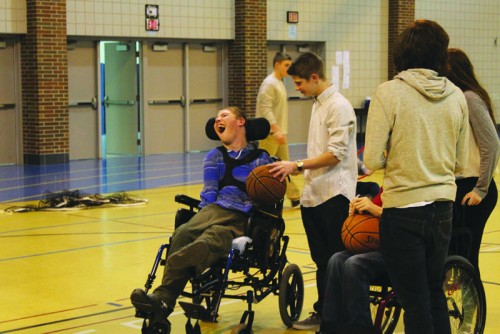“Don’t be such a retard!”
Alex Hiller, Peer Buddy and junior, said she heard a boy yell this across the table at her sixth-grade brother’s birthday party and deals with situations like this often.
“I got so upset with him,” she said. “It just breaks my heart that kids that young throw around a word that has so much meaning like it’s nothing. I told him he should not use that word and that it is horribly offensive.”
 According to r-word.org, the words “retard” or “retarded” are painful to hear because they are demeaning and derogatory toward people with intellectual disabilities. The Best Buddies club supports the R-word organization in asking people to “stop saying the R-word as a starting point toward creating more accepting attitudes and communities for all people.”
According to r-word.org, the words “retard” or “retarded” are painful to hear because they are demeaning and derogatory toward people with intellectual disabilities. The Best Buddies club supports the R-word organization in asking people to “stop saying the R-word as a starting point toward creating more accepting attitudes and communities for all people.”
Buddy and senior Sarah Sayles said, “I want people to stop saying it (because) it’s a bad word. It can hurt people’s feelings.”

Best Buddies sponsor Dana Lawrence said the club aims to raise awareness of the issue at this school. Like in the previous three years, members will sell End the R-Word wristbands as well as put up a poster for students to sign during all four lunch periods. By signing the poster, students pledge to stop saying the word.
“We’d like to hang the poster up somewhere around the school,” Lawrence said.
Hiller said she still tells people to stop using the word in casual conversation and has received mixed reactions.
She said, “I will say something along the lines of ‘that’s a really offensive thing to say, please don’t use that word.’”
According to Lawrence, though, almost every student who walked by the club’s booth last year signed the poster to state they would stop using the word.
However, it can be difficult to measure success. Lawrence said the club runs on the honor code and hopes students will be true to their promises.
“We just hope that they’re true to their honor because a lot of the kids sign it, and we’re hoping maybe they’ll spread it, saying ‘Hey, don’t use that word’ if they’re talking to their friends,” she said.
 “All I can really measure is how many people I hear say it,” Hiller said. “When one person believes in this and tells their friends and family not to say it, somebody in that group is bound to agree and do the same thing. I think the more people we can get to just to listen to what we have to say, the more times that message gets passed on. I want to raise awareness as much as possible. It’s something that is so hurtful, and I feel like everyone at some point in their lives has had something upsetting or hurtful said about them. Just imagine that being used as a diss universally.”
“All I can really measure is how many people I hear say it,” Hiller said. “When one person believes in this and tells their friends and family not to say it, somebody in that group is bound to agree and do the same thing. I think the more people we can get to just to listen to what we have to say, the more times that message gets passed on. I want to raise awareness as much as possible. It’s something that is so hurtful, and I feel like everyone at some point in their lives has had something upsetting or hurtful said about them. Just imagine that being used as a diss universally.”




























![Keep the New Gloves: Fighter Safety Is Non-Negotiable [opinion]](https://hilite.org/wp-content/uploads/2024/12/ufcglovescolumncover-1200x471.png)
















































![Review: “We Live in Time” leaves you wanting more [MUSE]](https://hilite.org/wp-content/uploads/2024/12/IMG_6358.jpg)
![Review: The premise of "Culinary Class Wars" is refreshingly unique and deserving of more attention [MUSE]](https://hilite.org/wp-content/uploads/2024/12/MUSE-class-wars-cover-2.png)
![Introducing: "The Muses Who Stole Christmas," a collection of reviews for you to follow through winter [MUSE]](https://hilite.org/wp-content/uploads/2024/12/winter-muse-4.gif)
![Review: "Meet Me Next Christmas" is a cheesy and predictable watch, but it was worth every minute [MUSE]](https://hilite.org/wp-content/uploads/2024/11/AAAAQVfRG2gwEuLhXTGm3856HuX2MTNs31Ok7fGgIVCoZbyeugVs1F4DZs-DgP0XadTDrnXHlbQo4DerjRXand9H1JKPM06cENmLl2RsINud2DMqIHzpXFS2n4zOkL3dr5m5i0nIVb3Cu3ataT_W2zGeDAJNd_E-1200x884.jpg)
![Review: "Gilmore Girls", the perfect fall show [MUSE]](https://hilite.org/wp-content/uploads/2024/11/gilmore-girls.png)
![Review in Print: Maripaz Villar brings a delightfully unique style to the world of WEBTOON [MUSE]](https://hilite.org/wp-content/uploads/2023/12/maripazcover-1200x960.jpg)
![Review: “The Sword of Kaigen” is a masterpiece [MUSE]](https://hilite.org/wp-content/uploads/2023/11/Screenshot-2023-11-26-201051.png)
![Review: Gateron Oil Kings, great linear switches, okay price [MUSE]](https://hilite.org/wp-content/uploads/2023/11/Screenshot-2023-11-26-200553.png)
![Review: “A Haunting in Venice” is a significant improvement from other Agatha Christie adaptations [MUSE]](https://hilite.org/wp-content/uploads/2023/11/e7ee2938a6d422669771bce6d8088521.jpg)
![Review: A Thanksgiving story from elementary school, still just as interesting [MUSE]](https://hilite.org/wp-content/uploads/2023/11/Screenshot-2023-11-26-195514-987x1200.png)
![Review: "When I Fly Towards You", cute, uplifting youth drama [MUSE]](https://hilite.org/wp-content/uploads/2023/09/When-I-Fly-Towards-You-Chinese-drama.png)
![Postcards from Muse: Hawaii Travel Diary [MUSE]](https://hilite.org/wp-content/uploads/2023/09/My-project-1-1200x1200.jpg)
![Review: "Ladybug & Cat Noir: The Movie," departure from original show [MUSE]](https://hilite.org/wp-content/uploads/2023/09/Ladybug__Cat_Noir_-_The_Movie_poster.jpg)
![Review in Print: "Hidden Love" is the cute, uplifting drama everyone needs [MUSE]](https://hilite.org/wp-content/uploads/2023/09/hiddenlovecover-e1693597208225-1030x1200.png)
![Review in Print: "Heartstopper" is the heartwarming queer romance we all need [MUSE]](https://hilite.org/wp-content/uploads/2023/08/museheartstoppercover-1200x654.png)




